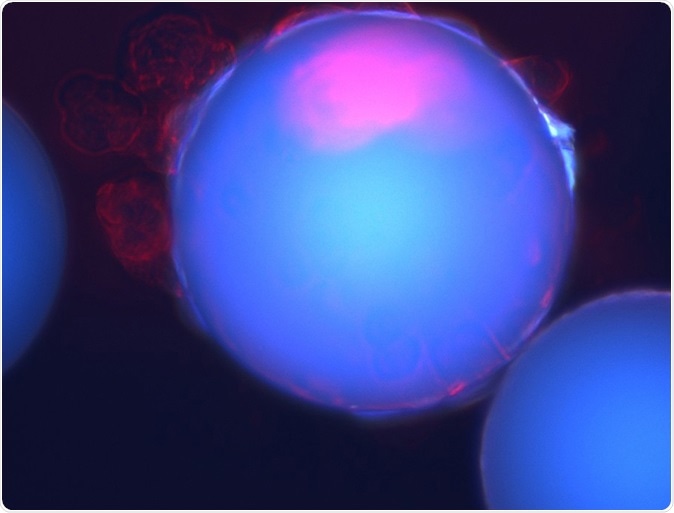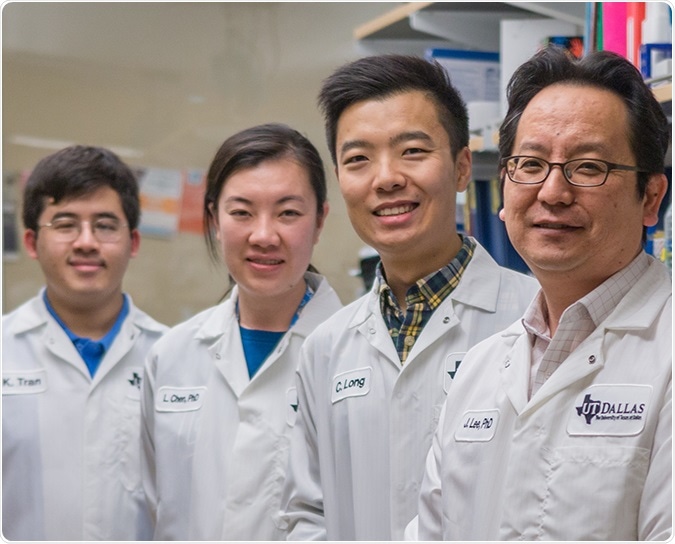University of Texas at Dallas researchers have managed to formulate a new technique by which they can isolate aggressive cells which can be the main cause behind metastasized cancers or cancers that have spread to other major organs from their primary site of occurrence.
This breakthrough may lead to isolation of these cells that could mean new ways of treatment could be devised against these cells. Results of the study are published in the latest issue of the journal Chemistry – A European Journal.

UT Dallas researchers used 40,000 tiny plastic beads (blue), each coated with a unique chemical compound, to identify one compound that bound only to breast cancer stem cells (red).
Dr. Jiyong Lee, assistant professor in the Department of Chemistry and Biochemistry in the School of Natural Sciences and Mathematics at UT Dallas explained that this new approach could help find ways in which cancer recurrence could be prevented. Dr Lee explained that not all cancers are same and some grow more aggressively than others. These cancer cells that grow more aggressively than others are the cancer stem cells. They migrate to other sites from the main area of occurrence and give rise to secondary tumors after the first one has been suitably treated.

From left: Kha Andy Minh Tran BS’16; Dr. Luxi Chen, postdoctoral research associate; Chao Long, a doctoral student in chemistry and biochemistry; and Dr. Jiyong Lee, assistant professor of chemistry and biochemistry, were involved in the cancer stem cell study.
Stem cells and cancer recurrence and spread are innately connected. Stem cells are mother cells that can turn into any cells of the body when programmed. In addition stem cells have the power to renew themselves to live longer than regular cells. They can turn into any cells including muscles, bone marrow cells, skin, major organ cells etc. Cancer stem cells are found in some aggressive tumours that help them grow rapidly and also spread to distant organs. Once the primary tumors are treated and cured, these aggressive stem cells that have migrated to other major organs such as the liver, lungs, bones etc., continue to migrate and set up shop at different parts of the body so to speak. Treatments that can cure the cancer cells at the primary sites are usually fruitless against these cancer stem cells which can travel via blood stream to different organs as cause metastasis or spread of the tumors. These take years to appear after the initial cancer but are more difficult to treat say researchers.
For this breakthrough, Lee and his team of researchers scanned through 40,000 chemical compounds to find which one would successfully bind to the breast cancer stem cells. Once bound the chemical would isolate the cells from their surrounding normal breast cells and breast cancer cells that were not aggressive in nature. They could finally isolate five different compounds or ligands that could bind to the cancer stem cells. They isolated one of these ligands for further evaluation. Lee explained that similar methods could be used to separate the cancer cells from normal cells as well but this study is unique because it could isolate the cancer stem cells from other cancer cells. This approach is a “novel” one he said.
According to Lee, if these cancer stem cells could be isolated and killed, the risk of spread of the cancer would be reduced. He says that this would stop the cancer from renewing itself and also prevent the onset of new cancers. At present there are no drugs that can specifically kill these cancer stem cells he said. One of the reasons for this could be the fact that these cells have never been isolated before.
They incubated a mixture of breast cancer cells and breast cancer stem cells and 40,000 tiny plastic beads that were coated with the new found ligand that could bind to the cancer stem cells. They noted that the ligand could bind specifically to the cancer stem cells and separate them. Now these cancer stem cells thus isolated and the cancer cells left behind were each injected to lab mice. They noted that the lab mice that were given cancer stem cells showed more rapid cancer growth and bigger and aggressive tumors compared to those injected with the cancer cells that were not stem cells. In the latter group there was no tumor growth at all. This means that if these cancer stem cells could be gotten rid of, they could eliminate the risk of tumor spread said Lee. This could pave the way for therapy as well as effective diagnosis of cancers and aggressive cancer spreads.
Source: http://onlinelibrary.wiley.com/doi/10.1002/chem.201705663/full